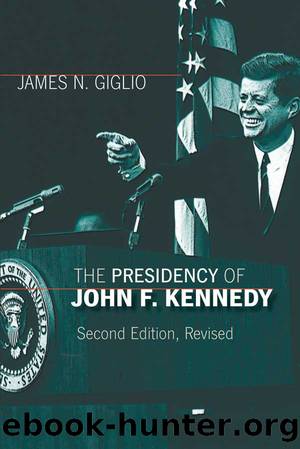The Presidency of John F. Kennedy by James N. Giglio

Author:James N. Giglio [Giglio, James N.]
Language: eng
Format: epub
Tags: Presidents & Heads of State, History & Theory, American Government, United States, Biography & Autobiography, 20th Century, Political Science, History, General
ISBN: 9780700614363
Google: fGMaAQAAIAAJ
Goodreads: 3882500
Publisher: University Press of Kansas
Published: 1991-12-12T00:00:00+00:00
8
THE MISSILES OF OCTOBER
In a 1965 interview Robert Kennedy singled out Cuba as the cause of the administrationâs greatest difficulties, particularly the humiliating defeat at the Bay of Pigs and the missile crisis of October 1962, which elevated the specter of nuclear holocaust to its highest level. Yet the October crisis also became Jack Kennedyâs greatest cold war victory, according to contemporary judgment. Most world and domestic leaders praised his courage, determination, and patience as he defused the Soviet nuclear threat in Cuba. Americans generally agreed that the president had overcome his greatest test in crisis management. As a result, the Kennedy foreign policy achieved a boost, and relations with the Soviet Union had mellowed by 1963.
Few Americans at the time understood how the first Cuban crisis contributed to the second one or the extent to which government leaders helped provoke Cuba II. Nor did anyone fully comprehend the degree to which Castro and Khrushchev feared a U.S. invasion of Cuba in summer 1962. Misperceptions and miscalculations abounded on both sides prior to and during that thirteen-day crisis, which explains why scholars and participants from the United States and the Soviet Union have focused so much attention on it.1 The inescapable conclusion is that crisis avoidanceârather than managementâmust be the determining consideration if nations are to avert nuclear catastrophe. This necessitates mutual understanding and frank exchanges, both of which were often lacking in the early 1960s.
The administration contributed to the missile crisis, coming just seven months after the Bay of Pigs, when President Kennedy approved Operation Mongoose, a covert CIA-inspired plan to topple Fidel Castro. By 1962, operating largely out of Miami, the anti-Castro activity comprised about four hundred Americans, two thousand Cubans, and an annual budget of about $50 million. The CIA promoted countless sabotage activities in Cuba designed to disrupt the economy, contaminated a sugar export shipment, encouraged European exporters to ship defective ball bearings into the country, sent in agents and weapons, and sought to assassinate Castro. By early October the operation increased its activities as a dissatisfied Robert Kennedy undertook administrative supervision of the âsecret war.â Overall, however, that effort failed in all its objectives.
In retrospect, Operation Mongoose did nothing more than provide the administration with a means to vent its frustrations over Castro. National security adviser McGeorge Bundy later called it âthe psychological salve for inaction.â2 No one felt more frustration and anger than Robert Kennedy, whose obsession with Castro was comparable to his crusade against Hoffa. Ray Cline of the CIA remembered Kennedy as âalways bugging the agency about the Cubans.â3 Both Kennedys exaggerated the Castro menace partly out of their staunch anticommunism and their vendetta against the Cuban leader and partly due to the political climate at home. This explains their early 1962 embargo on trade with Cuba, their successful efforts to ban Cuba from the Organization of American States (OAS), and their other attempts to isolate Castro, all of which bound Cuba closer to the USSR and made Castro an even greater menace.
Download
This site does not store any files on its server. We only index and link to content provided by other sites. Please contact the content providers to delete copyright contents if any and email us, we'll remove relevant links or contents immediately.
| U.K. Prime Ministers | U.S. Presidents |
Waking Up in Heaven: A True Story of Brokenness, Heaven, and Life Again by McVea Crystal & Tresniowski Alex(37788)
Empire of the Sikhs by Patwant Singh(23074)
We're Going to Need More Wine by Gabrielle Union(19034)
Hans Sturm: A Soldier's Odyssey on the Eastern Front by Gordon Williamson(18575)
Leonardo da Vinci by Walter Isaacson(13318)
The Radium Girls by Kate Moore(12018)
Tools of Titans by Timothy Ferriss(8369)
Educated by Tara Westover(8047)
How to Be a Bawse: A Guide to Conquering Life by Lilly Singh(7472)
Permanent Record by Edward Snowden(5839)
The Last Black Unicorn by Tiffany Haddish(5629)
The Rise and Fall of Senator Joe McCarthy by James Cross Giblin(5275)
Promise Me, Dad by Joe Biden(5144)
The Wind in My Hair by Masih Alinejad(5092)
A Higher Loyalty: Truth, Lies, and Leadership by James Comey(4954)
The Crown by Robert Lacey(4807)
The Iron Duke by The Iron Duke(4349)
Joan of Arc by Mary Gordon(4101)
Stalin by Stephen Kotkin(3957)
